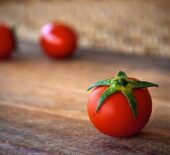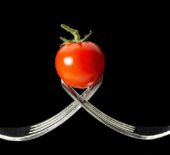Prostate cancer is the most commonly diagnosed cancer in Australia and 1/3rd most common cause of cancer death. An overall healthy and balanced diet is critical which includes enough servings of fruit and vegetables as well as low in saturated and trans fats. The mightiness of eating or drinking enough fruit and vegetable servings cannot be under rated and variety in the types increases the different types of components our body received to optimise health. Ways to increase the amount of fruit and vegetables in your diet can include taking fruit as a snack (bananas are great as they are already packaged in their peel and read to go), choosing fruit salad and low fat yoghurt as a dessert. Choosing the salad or side of vegetables instead of the fried chips, adding your favourite vegetables or fruits to sandwiches like tomato and lettuce or avocado as well as in pasta like rocket with sundried tomato and ricotta or tomato sauce with olives, eggplant and capsicum.
When looking specifically at prostate cancer there are specific foods which may assist in preventing this cancer. A two year study of 47 365 men concluded men who included lycopene in their diet, a carotenoid from tomatoes had a reduced risk of prostate cancer. Lycopene is better available to the body after processing and it was found tomato sauce decreased the risk of prostate cancer further than eating tomatoes! You can include tomato in your diet by adding it to sandwiches in a fresh slice, or add some tomato sauce to your favourite pasta, as part of the base of a pizza or make a dip to have with some fresh cut up vegetable sticks or wholegrain crackers. So give some love to the mighty tomato and include it as part of a healthy and balanced diet. Another study of 303 participants suggest rice, potato and chicken may reduce the risk of prostate cancer.
Foods which may increase the risk of prostate cancer include processed and fresh red and white meats with the skin and fat left on, processed meat includes bacon, salami, sausage and ready to eat sandwich meats. A diet high in fat, specifically trans and saturated fat is linked to prostate cancer. The main places saturated fat can be found is from animal products this includes butter, cheese, ice cream, the fat on red and white meat as well as from non-animal sources including coconut and palm oil. Trans fats are a form of unsaturated fat but because of the way it has been processed it acts like a saturated fat. Trans fats can be found in foods like biscuits and chips, fried foods and baked goods like pies and pastries.
When considering how to make changes in your life to reduce the risk of prostate cancer, it is important to see the big picture. An overall balanced diet and healthy lifestyle choices will more likely have far greater impact on health than a single magic food. Knowledge is power and you can make a difference to your health if you choose to take a long term, balanced approach to improve your health.
References:
1. Giovannucci E, Rimm EB, Liu Y, Stampfer MJ, Willett WC. A prospective study of tomato products, lycopene, and prostate cancer risk. Journal of the National Cancer Institute. 2002;94(5):391-8.
2. Australian Institute of Health and Welfare. ACIM (Australian Cancer Incidence and Mortality) Books. Canberra: AIHW.
3. Australian Institute of Health and Welfare & Australasian Association of Cancer Registries 2012. Cancer in Australia: an overview, 2012. Cancer series no. 74. Cat. no. CAN 70. Canberra: AIHW.
4. Vlajinac H, Ilic M, Marinkovic J, Sipetic S. Nutrition and prostate cancer. Journal of BUON : official journal of the Balkan Union of Oncology. 2010;15(4):698.
5. Patel VH. Nutrition and prostate cancer: an overview. Expert review of anticancer therapy U6 - ctx_ver=Z3988-2004&ctx_enc=info%3Aofi%2Fenc%3AUTF-8&rfr_id=info%3Asid%2Fsummonserialssolutionscom&rft_val_fmt=info%3Aofi%2Ffmt%3Akev%3Amtx%3Ajournal&rftgenre=article&rftatitle=Nutrition+and+prostate+cancer%3A+an+overview&rftjtitle=Expert+review+of+anticancer+therapy&rftau=Patel%2C+Venita+H&rftdate=2014-11-01&rfteissn=1744-8328&rftvolume=14&rftissue=11&rftspage=1295&rft_id=info%3Apmid%2F25367323&rft_id=info%3Apmid%2F25367323&rftexternalDocID=25367323¶mdict=en-US U7 - Journal Article. 2014;14(11):1295.
6. Manolis AS. You Are What You Eat, Hence Curtail Saturated and Trans Fats, Free Sugars and Salt. Hospital Chronicles. 2016;11(2):65.








